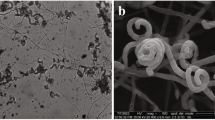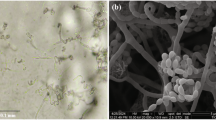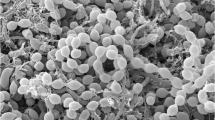Abstract
Strain HUAS MG91T, a novel actinobacterium, was isolated from the rhizosphere soil of Nicotiana tabacum collected from Changde City, China. This strain could form short, rod-shaped spores with a smooth surface and Rectiflexibles spore chains on Gause’s synthetic No.1 medium. Comparison of 16S rRNA gene sequences showed that strain HUAS MG91T exhibited the highest similarity to Streptomyces kunmingensis NBRC 14463 T (98.95%). Phylogenetic analysis based on 16S rRNA gene and genome sequences indicated that strain HUAS MG91T was closely related to S. kunmingensis NBRC 14463 T. However, the ANIm and dDDH values between them were 87.25% and 28.60%, respectively, lower than the 96.7% ANIm threshold and 70.0% cutoff point used as guideline values for Streptomyces species delineation. On the basis of phenotypic and genotypic differentiation from tested strains, strain HUAS MG91T is proposed to represent a novel species of the genus Streptomyces, named Streptomyces tabacisoli sp. nov. The type strain is HUAS MG91T (=MCCC 1K09288T = JCM 37027 T).
This is a preview of subscription content, access via your institution
Access options
Subscribe to this journal
Receive 12 print issues and online access
$259.00 per year
only $21.58 per issue
Buy this article
- Purchase on SpringerLink
- Instant access to the full article PDF.
USD 39.95
Prices may be subject to local taxes which are calculated during checkout



Similar content being viewed by others
References
Liu Y, Chen L, Qin XY. Investigation on the harm of tobacco bacterial wilt and isolation of pathogenic bacteria in Yunnan Province. China Agron Bull. 2007;23:4.
Zhou XJ, Wang J, Yang YW. Research progress of tobacco bacterial wilt. Bull Microbiol. 2012;39:8.
Wang LL, Shi JX, Yuan SF. Microbial organic fertilizer combined with soil conditioner to control tobacco bacterial wilt. J Soil Sci. 2013;50:153–8.
Allard HA. The mosaic disease of tobacco. Science. 1912;36:875–6.
Kaji K, Sonoda T, Tairako K. Streak disease of tomato fruit caused by tobacco mosaic virus (TMV) and its control by attenuated TMV. Ann Phytopathol Soc Japan. 1993;59:324.
Liu XD, Xiao QN. Preliminary study on the mechanism of botanical pesticides against tobacco mosaic. Chin J Biol Control. 1997;13:128–31.
Li HG, Zhong Q, Zhang S. Field control effect of 8 kinds of medicaments on tobacco mosaic virus disease. Acta Agriculturae Jiangxi. 2012;24:100–1.
Fan YL, WB N, Hu ZD. Symptom identification and comprehensive control technology of tomato virus disease. Northwest Horticulture Veg. 2015;2:33–35.
Dong Y. Study on sustained-release fungicide of controlling tobacco black shank. Chin Acad Agric Sci. 2015;1:1–57.
Shang HS. Modern Plant Immunology, China Agricultural Press, 2013-02-01.
Yang JQ, Jiang T, Cheng HY. Tobacco Pathology. University of Science and Technology of China Press, 2003-07.
Nie N. Application of biotechnology in plant disease and pest control. Agric Dev Equip. 2024;7:184–6.
Zhang G, Peng YL, Mei JY, et al. Evaluation of biocontrol potential of tobacco phytophthora against actinomycetes. Chin J Biol Control. 2023;39:667–75.
Li KQ, Guo YH, Wang JZ, Wang ZY, Gao J. Streptomyces aquilus sp. nov., a novel actinomycete isolated from a Chinese medicinal plant. Int J Syst Evol Microbiol. 2020;70:1912–7.
Atlas RM. Handbook of microbiological media. In: Parks LC, editor. CRC Press, Boca Raton; 1993.
Jiang CR, Ruan JS. Two new species and a new variety of Ampullarella. Acta Microbiol Sin. 1982;22:207–11.
Shirling EB, Gottlieb D. Methods for characterisation of Streptomyces species. Int J Syst Bacteriol. 1966;16:313–40.
Ridgway R. Color standards and color nomenclature. Washington, DC; Published by the author (1850-1929), 1912. p 1–43.
Actinomycete Systematics: Principle, Methods and Practice. Beijing: Science press (Q939); 2007.
MIDI. Sherlock Microbial Identification System Operating Manual, Version 6.0. Newark DE: MIDI Inc,; 2005.
Komagata K, Suzuki KI. Lipid and cell-wall analysis in bacterial systematics. Method Microbiol. 1987;19:161–207.
Collins MD, Pirouz T, Goodfellow M, Minnikin DE. Distribution of menaquinones in actinomycetes and corynebacteria. J Gen Microbiol. 1977;100:221–30.
Kroppenstedt RM. Fatty acid and menaquinone analysis of actinomycetes and related organisms. Chem Methods Bacterial Syst. 1985;20:173–99.
Hasegawa T, Takizawa M, Tanida S. A rapid analysis for chemical grouping of aerobic actinomycetes. J Gen Appl Microbiol. 1983;29:319–22.
Lechevalier MP, Lechevalier H. Chemical composition as a criterion in the classification of aerobic actinomycetes. Int J Syst Evol Microbiol. 1970;20:435–43.
Lane DJ. 16S/23S RNA sequencing. In: Stackebrandt E, Goodfellow M, editors, Nucleic acid techniques in bacterial systematics. London: Wiley;1991. p. 115–75.
Yoon SH, Ha SM, Kwon S, Lim J, Chun J. Introducing EzBioCloud: a taxonomically united database of 16S rRNA gene sequences and whole-genome assemblies. Int J Syst Evol Microbiol. 2017;67:1613–7.
Aziz RK, Bartels D, Best AA, DeJongh M, Disz T, et al. The RAST server: rapid annotations using subsystems technology. BMC Genom. 2008;9:75.
Blin K, Shaw S, Kloosterman AM, Charlop-Powers Z, van Wezel GP, et al. antiSMASH 6.0: improving cluster detection and comparison capabilities. Nucleic Acids Res. 2021;49:W29–W35.
Felsenstein J. Evolutionary trees from DNA sequences: a maximum likelihood approach. J Mol Evol. 1981;17:368–76.
Kluge AG, Farris JS. Quantitative phyletics and the evolution of anurans. Syst Zool. 1969;18:1–32.
Saitou N, Nei M. The neighbor-joining method: a new method for reconstructing phylogenetic trees. Mol Biol Evol. 1987;4:406–25.
Tamura K, Stecher G, Kumar S. MEGA11: molecular evolutionary genetics analysis Version 11. Mol Biol Evol. 2021;38:3022–7.
Meier-Kolthoff JP, Göker M. TYGS is an automated high-throughput platform for state-of-the-art genome-based taxonomy. Nat Commun. 2019;10:2182.
Richter M, Rosselló-Móra R. Shifting the genomic gold standard for the prokaryotic species definition. Proc Natl Acad Sci USA. 2009;106:19126–31.
Meier-Kolthoff JP, Auch AF, Klenk HP, Göker M. Genome sequence-based species delimitation with confidence intervals and improved distance functions. BMC Bioinform. 2013;14:60.
Hu SR, Li KQ, Zhang YF, Wang YF, Gao J. New insights into the threshold values of multi-locus sequence analysis, average nucleotide identity and digital DNA-DNA hybridization in delineating Streptomyces species. Front Microbiol. 2022;13:910277.
Wayne LG, Brenner DJ, Colwell RR, Grimont PAD, Kandler O, et al. International committee on systematic bacteriology. Report of the ad hoc committee on the reconciliation of approaches to bacterial systematics. Int J Syst Bacteriol. 1987;37:463–4.
Vincent L, Richard D, Olivier G. FastME 2.0: a comprehensive, accurate, and fast distance-based phylogeny inference program. Mol Biol Evo. 2015;32:2798–2800.
Farris JS. Estimating phylogenetic trees from distance matrices. Am Nat. 1972;106:645–68.
Acknowledgements
All authors would like to thank MCCC (Marine Culture Collection of China, MCCC) and China Center of Industrial Culture Collection (CICC, China) for providing us with excellent technical assistance.
Funding
This work was supported by the National Natural Science Foundation of China (62472168).
Author information
Authors and Affiliations
Contributions
KL, AD, JG, and WL conceived the idea of the study and purchased type strains. KL, HZ, YQ, PM, and AD conducted an experiment, prepared figures and tables. KL and HZ wrote the main manuscript text. JG and WL corrected and reviewed the paper.
Corresponding author
Ethics declarations
Conflict of interest
The authors declare no competing interests.
Additional information
Publisher’s note Springer Nature remains neutral with regard to jurisdictional claims in published maps and institutional affiliations.
Supplementary information
Rights and permissions
Springer Nature or its licensor (e.g. a society or other partner) holds exclusive rights to this article under a publishing agreement with the author(s) or other rightsholder(s); author self-archiving of the accepted manuscript version of this article is solely governed by the terms of such publishing agreement and applicable law.
About this article
Cite this article
Li, K., Zhang, H., Qian, Y. et al. Streptomyces tabacisoli sp. nov, isolated from the rhizosphere soil of Nicotiana tabacum. J Antibiot 78, 229–234 (2025). https://doi.org/10.1038/s41429-024-00802-7
Received:
Revised:
Accepted:
Published:
Version of record:
Issue date:
DOI: https://doi.org/10.1038/s41429-024-00802-7



